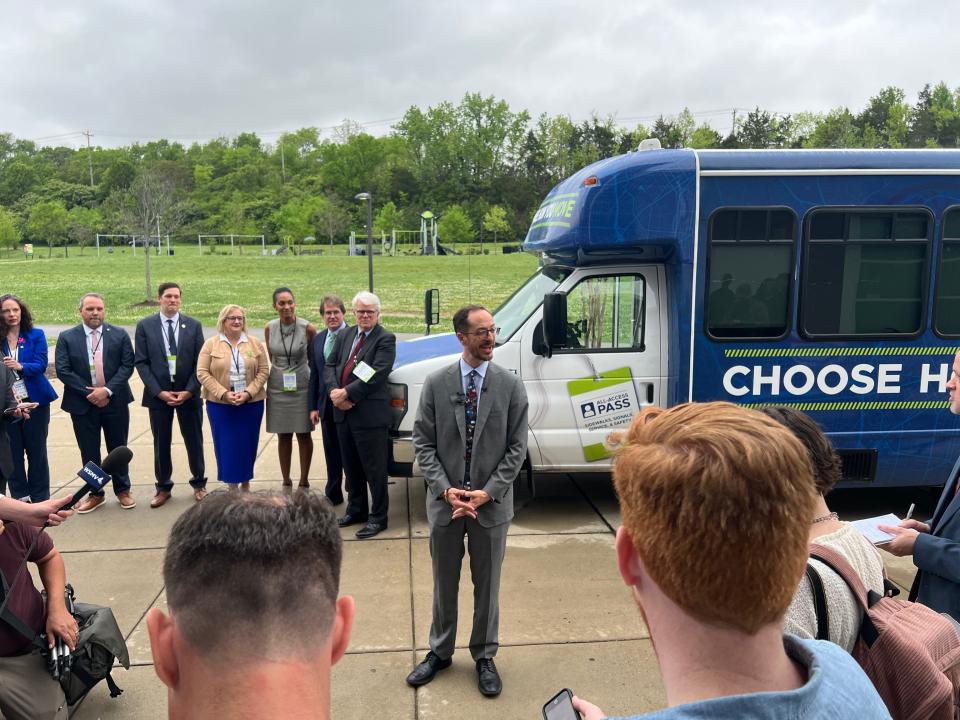Oracle plans a world headquarters in Nashville. That puts transit plans on the fast track
Oracle co-founder Larry Ellison corrected himself slightly after he said he planned to bring a "world headquarters" to Nashville during remarks at a conference Tuesday.
"I shouldn't have said that," Ellison told former Senate Majority Leader and physician Bill Frist at the Oracle Health Summit in Midtown.
The global company's headquarters is in Austin, but Oracle has been preparing for a massive presence on 70 acres of riverfront property on Nashville's East Bank that officials say would be a co-headquarters with the Texas capital city.
While it may have been a slip of the tongue, Ellison sent a clear message that Oracle is here and its investment will be massive, and while that fact alone continues Nashville's trajectory as a "superstar city," it brings up the old question: "How does Music City manage this growth?"
The growth comes with worsening traffic and unaffordable housing to many residents, but the Oracle news aligns to a development in Nashville politics that could help alleviate some of the stress: Mayor Freddie O'Connell's transit referendum proposal.
Nashville mayor's 2024 transit proposal offers no 'mystery meat' like in 2018
The mayor formally launched his $3.1 billion transit plan on April 19 at the Southeast Nashville Community Center in Antioch.
Vice Mayor Angie Henderson and O'Connell rode the No. 55 bus from downtown to the venue, but bus expansion is only a part of the plan.

More important, there are proposed investments in sidewalks, infrastructure, traffic signal coordination and safety. There are also plans to buy land for parks and housing, which are sorely needed in a growing city.
Unlike the $5 billion-to-$9 billion failed transit referendum in 2018, there is no "mystery meat" here, such as a vague tunnel underneath downtown, and there is no light rail.
Gov. Bill Lee wanted it, ordinary Tennesseans didn’t. School vouchers failed. Time to move on
While transit advocates would love to see rail, citizens must face the reality that only about 1% of people in Middle Tennessee use public transportation as a commuting option, according to Census figures. Rail could be part of a future plan, but keep it simple now to score a win.
Moreover, as housing gets more expensive and congestion worsens, alternatives to the automobile are beneficial to a wide swath of groups including low-income residents, workers, seniors and anyone who might want to take the occasional ride to a sporting or music event because parking is scarce and expensive.
The Bible is now an official Tennessee book. The state is walking a constitutional tightrope.
Early pushback to O'Connell's plan is that it would require a sales tax increase to make it happen. Some people are opposed to any kind of tax and others contend the sales tax a regressive way to pay for this kind of program, preferring, for example, a property tax increase. The influential interfaith group Nashville Organized for Action and Hope wants concessions such as free bus passes for low-income residents and a commitment from Metro Nashville to eliminate the city's sales tax on groceries.
State law limits the kind of funding counties can impose to build a transit plan, and the sales tax means Nashville's growing number of visitors will also contribute to the city's infrastructure.
Nashville residents say they want transit even as they are concerned about growth
Recent polling from Vanderbilt University and the Imagine Nashville community engagement effort show residents embrace more transit options in the city.
Years ago, as Amazon was looking to find another set of headquarters, transit and transportation options were part of the deal, and despite Nashville's limited transit system, the company saw the potential that city leaders would meet the growth needs of the community.
It has been a rocky path due to a rapid succession of changes to local political leadership, the COVID-19 pandemic, and souring attitudes towards growth and citizens not feeling included in Nashville's prosperity.
The Vanderbilt Poll, however, showed that after two years of respondents saying they felt Nashville was headed in the wrong direction, that attitude has flipped toward a positive and upward trajectory.
The Oracle announcement confirms that the growth train is moving ahead. Will citizens figuratively get on board?
David Plazas is the director of opinion and engagement for the USA TODAY Network Tennessee. He is an editorial board member of The Tennessean. He hosts the Tennessee Voices videocast and curates the Tennessee Voices and Latino Tennessee Voices newsletters. Call him at (615) 259-8063, email him at [email protected] or tweet to him at @davidplazas.
This article originally appeared on Nashville Tennessean: Oracle headquarters moving to Nashville adds transit plan urgency
